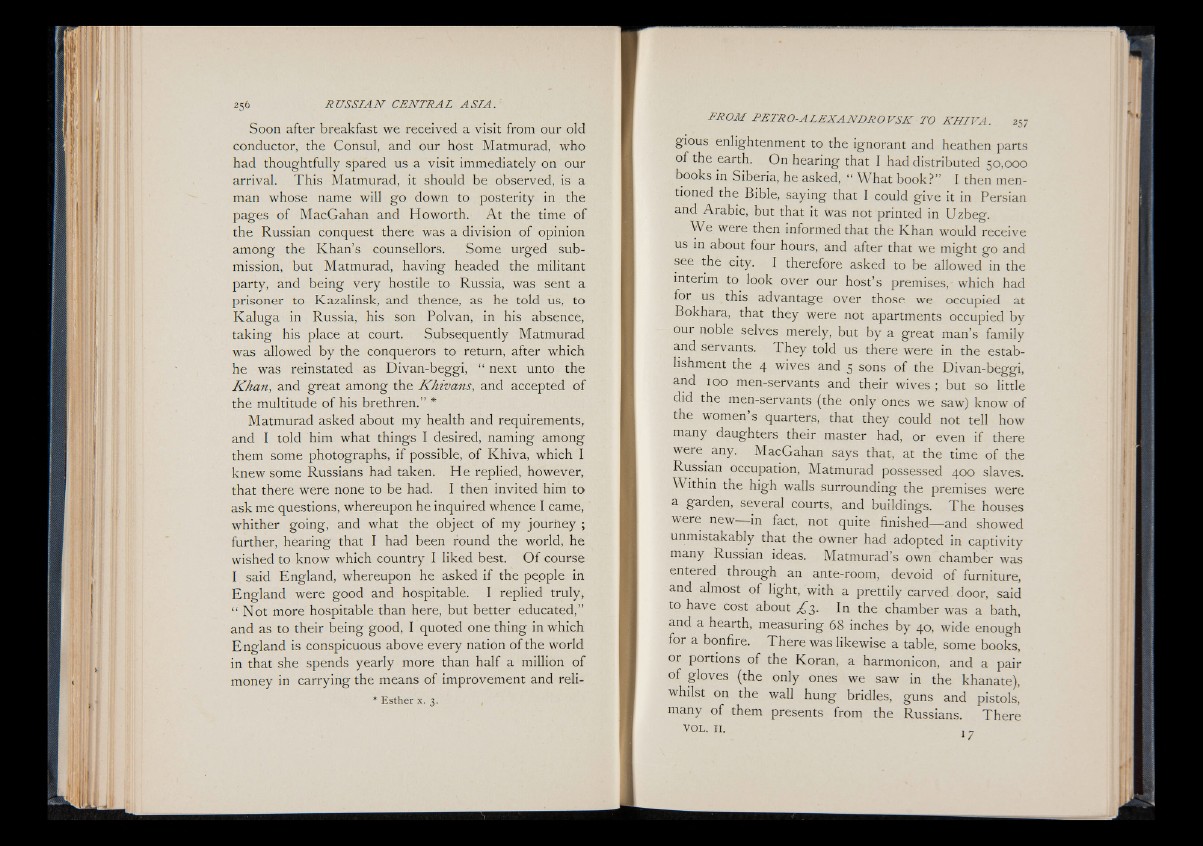
Soon after breakfast we received a visit from our old
conductor, the Consul, and our host Matmurad, who
had thoughtfully spared us a visit immediately on our
arrival. This Matmurad, it should be observed, is a
man whose name will go down to posterity in the
pages of MacGahan and Howorth. A t the time o f
the Russian conquest there was a division of opinion
among the Khan’s counsellors. Some urged submission,
but Matmurad, having headed the militant
party, and being very hostile to Russia, was sent a
prisoner to Kazalinsk, and thence, as he told us, to
Kaluga in Russia, his son Polvan, in his absence,
taking his place at court. Subsequently Matmurad
was allowed by the conquerors to return, after which
he was reinstated as Divan-beggi, “ next unto the
Khan, and great among the Khivans, and accepted of
the multitude of his brethren.” *
Matmurad asked about my health and requirements,
and I told him what things I desired, naming among
them some photographs, if possible, of Khiva, which I
knew some Russians had taken. He replied, however,
that there were none to be had. I then invited him to
ask me questions, whereupon he inquired whence I came,
whither going, and what the object of my journey ;
further, hearing that I had been found the world, he
wished to know which country I liked best. O f course
I said England, whereupon he asked if the people in
England were good and hospitable. I replied truly,
“ Not more hospitable than here, but better educated,”
and as to their being good, I quoted one thing in which
England is conspicuous above every nation of the world
in that she spends yearly more than half a million o f
money in carrying the means of improvement and religious
enlightenment to the ignorant and heathen parts
of the earth. On hearing that I had distributed 50,000
books in Siberia, he asked, “ What book?” I then mentioned
the Bible, saying that I could give it in Persian
and Arabic, but that it was not printed in Uzbeg.
We were then informed that the Khan would receive
us in about four hours, and after that we might go and
see the city. I therefore asked to be allowed in the
interim to look over our host’s premises, which had
for us this advantage over those we occupied at
Bokhara, that they were not apartments occupied by
our noble selves merely, but by a great man’s family
and servants. They told us there were in the establishment
the 4 wives and 5 sons of the Divan-beggi,
and 100 men-servants and their wives ; but so little
did the men-servants (the only ones we saw) know of
the women’s quarters, that they could not tell how
many daughters their master had, or even if there
were any. MacGahan says that, at the time of the
Russian occupation, Matmurad possessed 400 slaves.
\A/ ithin the high walls surrounding the premises were
a garden, several courts, and buildings. T he houses
were new in fact, not quite finished— and showed
unmistakably that the owner had adopted in captivity
many Russian ideas. Matmurad’s own chamber was
entered through an ante-room, devoid o f furniture,
and almost of light, with a prettily carved door, said
to have cost about ^3. In the chamber was a bath,
and a hearth, measuring 68 inches by 40, wide enough
for a bonfire. There was likewise a table, some books,
or portions of the Koran, a harmonicon, and a pair
of gloves (the only ones we saw in the khanate),
whilst on the wall hung bridles, guns and pistols,
many of them presents from the Russians. There
v o l . 11. . , 17